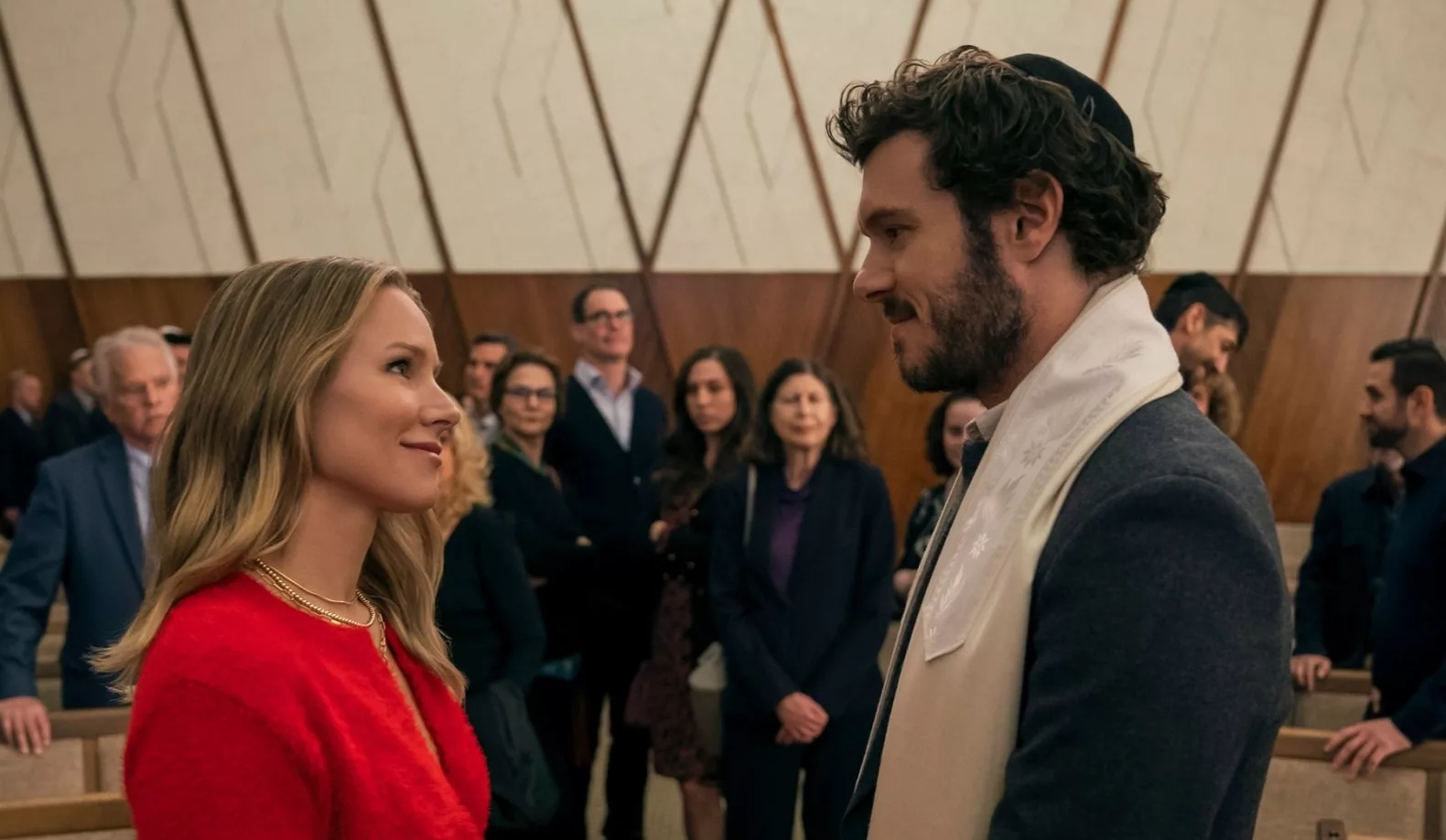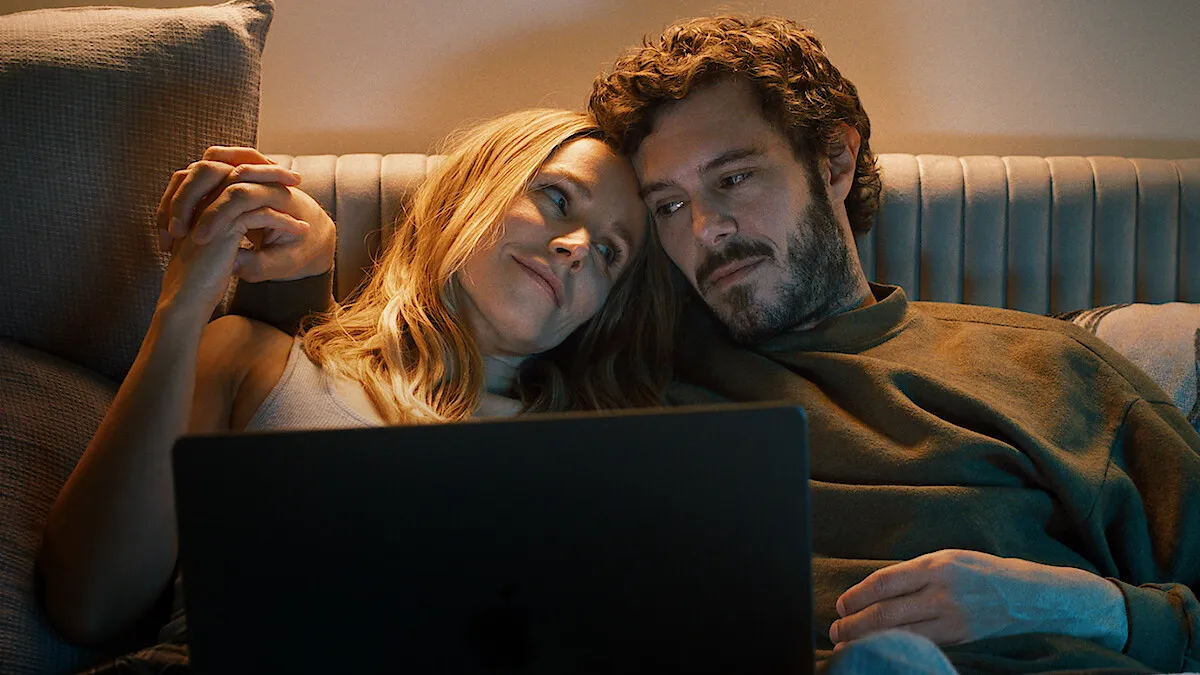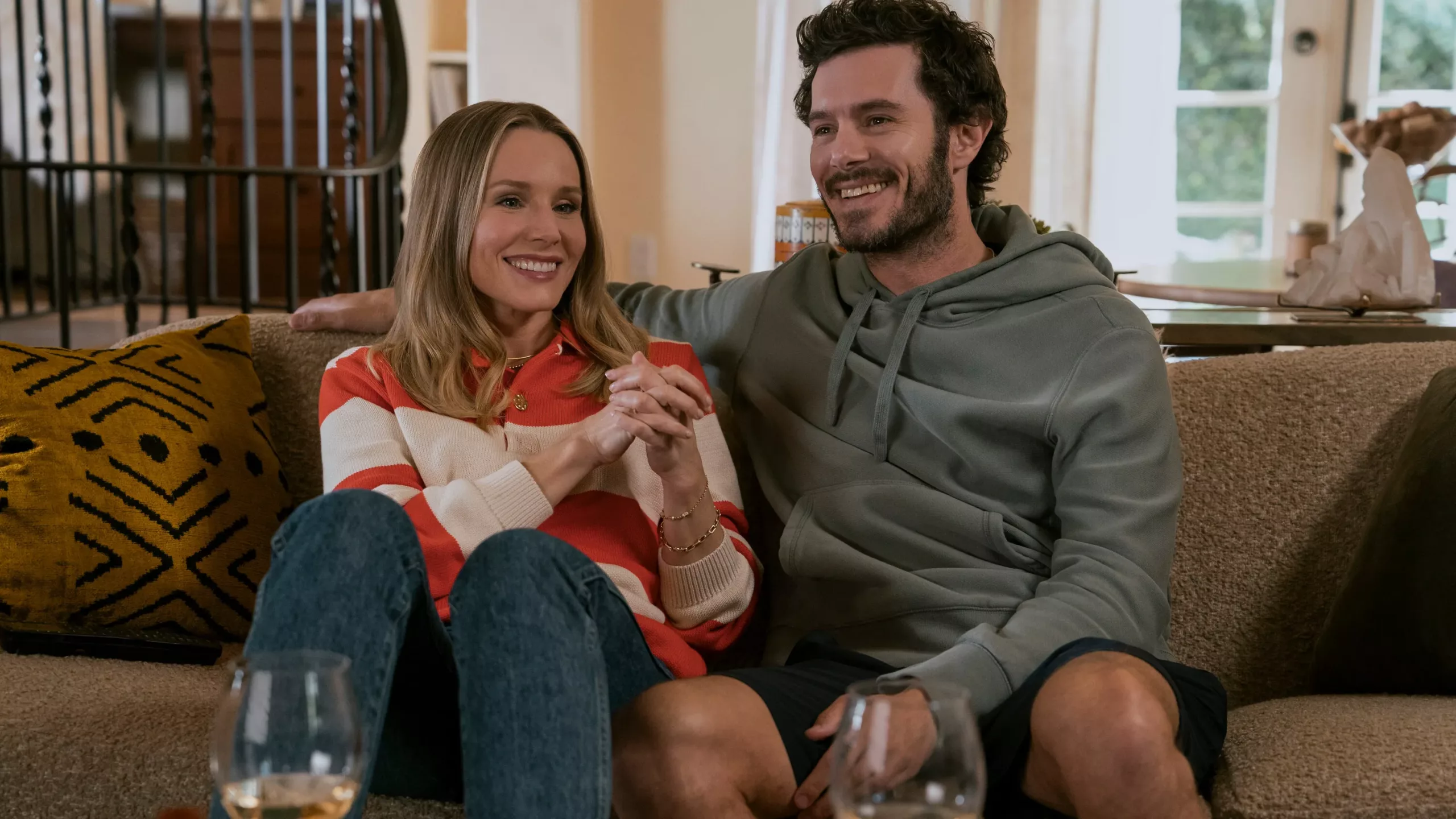If you were a teen in the early 2000s, chances are Kristen Bell and Adam Brody held some nostalgic place in your heart. Bell charmed viewers as the bold yet troubled teenage detective Veronica Mars. Meanwhile, Brody won fans over with his portrayal of lovable stoner Seth Cohen on The O.C. Over a decade later, these two iconic characters are back—but all grown up.
In the new Netflix romantic comedy Nobody Wants This, Bell plays Joanne, a sharp-tongued podcaster exploring the messy world of dating and relationships. Brody takes on the role of Noah, a progressive Rabbi searching for meaning after ending a long relationship. The two cross paths at a party and feel an instant spark, despite coming from very different worlds.
Noah still holds firmly to his Jewish faith, even if he adds his own modern twists. Joanne, on the other hand, is an avowed atheist who prefers living spontaneously. As they start falling for each other, many obstacles stand in their way. Noah faces disapproval from his tight-knit religious community. Joanne must navigate Noah’s traditions while staying true to herself.
Created by Erin Foster, Nobody Wants This takes inspiration from her own interfaith romance. Bell and Brody’s electric on-screen chemistry keeps viewers entertained as the will-they-or-won’t-they storyline plays out. For anyone looking to revisit two beloved characters or seeking an uplifting romantic comedy, this new series delivers just the right mix of feels and laughs.
Developing Couples
Joanne lives wildly without restraint, hosting a popular podcast where she freely discusses sex and relationships. Her outlook on dating stems from past failures at love, leaving her guarded. Yet underneath lies a desire for real connection. As a rabbi, Noah seems her polar opposite—devoutly religious and rooted in tradition. But he embraces modern reforms too. Recently single, Noah now questions what he truly wants for his future.
When these unlikely souls meet, their chemistry sparks instantly despite their differences. Noah proves unpredictable compared to Joanne’s former partners. Through humor and patience, he chips away at her defenses. Joanne challenges his views while finding fulfillment in his devotion. Noah faces obstacles as his community disapproves of a non-believer. But he refuses to sacrifice his growing bond with Joanne.
Morgan shares her sister’s brash personality yet harbors insecurities too. As podcast co-host, she fears Joanne changing will harm their career. But witnessing Joanne’s new happiness softens Morgan’s stance. Joanne’s bond with Noah influences Morgan to open up beyond flings.
Noah’s brother Sasha teases relentlessly but understands Noah best. He pushes Sasha to embrace life’s messiness as he does. Sasha’s wit hides loneliness appeased by his platonic bond with Morgan. Esther anchors a judgmental side, threatened by Noah’s romance-risking traditions. But her sharp tongue stems from caring deeply for family.
This diverse group’s perspectives enrich the leads’ journey. Though tensions arise, their development mirrors Joanne and Noah’s journey to find acceptance despite seemingly opposing pasts.
A Match Made in Nostalgia
From the moment Joanne and Noah meet, sparks fly between them. Her brash wit collides beautifully with his gentle humor. Fans of Bell and Brody’s past iconic roles will feel instantly transported back in time. But these characters are far from the teens we last saw them as.
Joanne and Noah connect through playful banter, finding surprising camaraderie in their differences. Her casual bluntness surprises yet intrigues our reserved rabbi. For Joanne, Noah offers a sweetness unknown from past paramours. Behind barbs and bravado, she too yearns for true care.
Their chemistry exposes walls each built as protection from past hurts. Yet breaking down one another’s defenses occurs not through force but delicate patience. Joanne softens as Noah supports her dreams without restraint. He opens through humoring her challenging views, not reacting defensively to challenges to his faith.
Sweet moments like a hand holding too long reveal depths beneath surface attractions. Their tender first kiss sparks a vulnerability in both previously reserved for fiction alone. Real intimacy develops not from passion alone but mutual understanding and respect.
Steadily, this unlikely pair learns to see from another’s perspective. Discovering common ground surprises more than divisions defined them. Their bond blossoms from opening minds more than any physical act. By credting space to simply know one another, fences fall without resentment on either side.
Joanne and Noah’s romance retains nostalgia’s magic while progressing beyond nostalgia’s limits. Their relationship respects the realities of diversity within closeness. By investing in understanding above all else, they build a connection for the ages.
Threading Tradition and Transition
Navigating profound differences tests Joanne and Noah’s bond. As an atheist and religious man, reconciling spiritual paths while respecting one another proves difficult. Joanne challenges Noah to justify ages-old rules. He gently urges her openness to traditions’ meaning for him.
Community disapproval impacts their careers too. Noah risks promotion by dating outside his faith. Joanne questions podcast changes from finding stability. But together they learn compromising beliefs need not mean abandoning identity. Through adapting and not abandoning themselves, new understanding emerges.
Of course, humor eases tensions. Jokes probe stereotypes but arise from character quirks, not maliciousness. Laughter opens dialogue on bridging worldviews. Though stumbling, nobody intends harm. With patience, even insensitive remarks become teaching moments instead of wedges.
Overall themes underscore relationships’ complexities regardless of backgrounds. Faced with prejudices, the couple strengthens not by ignoring problems but by earnestly addressing them. Fans root for their atypical coupling not despite challenges but because of honestly tackling life’s difficulties hand in hand.
Threading Identity and Individuality
Nobody Wants This draws praise for authentically depicting Jewish traditions through faithful details and astute Jewish casting. Holidays feel genuinely celebrated rather than superficial props.
Yet at times, characters risk feeling defined less by multidimensional personalities than singular religious roles. Bina borders on a matriarchal caricature. While realistic pressures exist, portraying all men as dominated discounts individual agency.
More nuance could show Judaism’s diversity beyond peripheral stereotypes. Not every family mirrors others to such a formulaic degree. Stronger three-dimensionality would complexify rather than reduce characters according to ready-made labels.
Delving into Noah’s quieter spirituality versus Sasha’s brash exterior hints at depth beneath surfaces. Further exploring faith’s private relevances beyond public appearances could enrich portrayals. as does lending Morgan greater depths than wit alone allows.
Overall, Nobody Wants This risks essentializing what it aims to represent. With care to honor characters as complete human beings rather than stock roles, it can foster understanding beyond any one background by bringing individuals to light.
Room for Growth Amid the Laughter
Nobody Wants This delivers plenty of chuckles with its witty writing. However, like any comedy, it risks falling back on familiar tropes. Predictable plot points and unrealistic backstories stretch believability at times.
The sisters’ podcast reaches phenomenal success seemingly overnight. While boosting their story, its sudden rise strains credibility. Character backgrounds also oversimplify complex real-world dynamics.
More problematic, sporadic jokes tread too close to bullying. Derogatory ethnic references risk normalizing prejudice regardless of intent. While humor provokes, inflicting harm should avoid even accidental offense.
This suggests avenues for growth. Leaning less on stale tropes leaves space for fresher narratives. Grounding outlandish moments maintains relatability. And excising potentially toxic humor keeps viewers laughing without collateral damage.
None of these dim the show’s charms, only nudge realizing its full potential. Subtler stereotype subversions plus richer character treatments could strengthen an already enjoyable rom-com. With refinement, Nobody Wants This may spark ever more smiles and thoughtfulness too.
An Imperfect Gem Worth Rediscovering
While predictable in spots, Nobody Wants This succeeds through its stars’ charisma. Bell and Brody ignite such fun sparks; recalling past roles felt like a treat. Their chemistry births true tenderness amid banter. Carried by affable performances, each episode entertains.
Of course, certain tropes and stereotypes could use refinement. At times, caricatures overshadow character depth. Yet gazing past imperfections, this rom-com embraces its purpose—leaving viewers smiling.
Should Netflix greenlight another season, room for growth remains. Deeper insights into challenges facing diverse relationships could strengthen an already enjoyable romp. With care, this series showing intertwining lives despite distances between them might find ever richer meaning.
Imperfect yet meaningful, Nobody Wants This offers simple yet powerful lessons. Beyond predicted plot points lies understanding different paths may lead to shared happiness. For lighthearted romance and nostalgia’s comforts, this series offers lasting impact worth rediscovering.
The Review
Nobody Wants This
Despite some predictable storytelling and caricatural moments, Nobody Wants This is an overwhelmingly charming romantic comedy. Led by the irresistible chemistry between its stars, the series offers an endearing will-they-or-won't-they storyline buoyed by sharp humor and heart. While not without room for improvement, its earnest exploration of relationships makes it consistently enjoyable.
PROS
- Electric on-screen chemistry between Kristen Bell and Adam Brody
- Humorous writing with quirky observational humor
- Interesting exploration of interfaith relationships and cultural barriers
- Strong performances from supporting cast members like Justine Lupe and Timothy Simons
- Uplifting examination of finding common ground with different beliefs
CONS
- Occasional reliance on predictable romantic comedy tropes
- Some character stereotypes feel one-dimensional.
- Plot conveniences like the podcast's unrealistic success
- Jokes skirting offensive at times regarding faith and ethnicity
- Subplots like the sisters' career left underdeveloped





















































